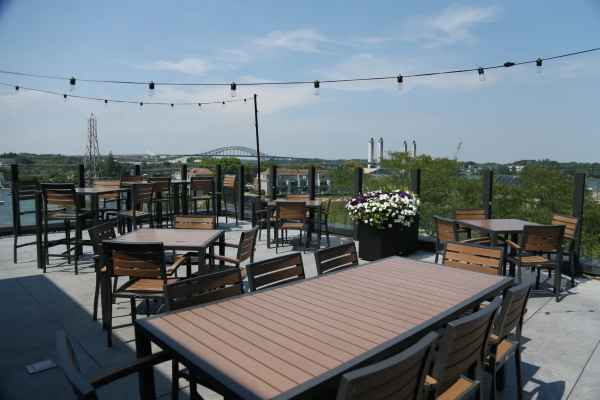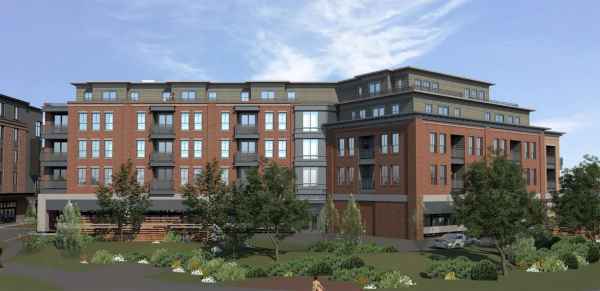Portsmouth mayor: Local fee on hotel rooms would raise much needed public safety funds
A New Hampshire state lawmaker has proposed creating enabling legislation to allow local cities or towns to impose a “local public safety assessment” on hotel and motel rooms.
The legislation is aimed at creating a new revenue stream for police, fire and first responders who must deal with the increase in tourism in popular tourist towns and cities like Portsmouth and Conway, according to state Rep. Thomas Buco.
The Democrat from Conway is the prime sponsor of the legislation.
“My intent was for the state Legislature to grant municipalities the authority to do this if they wanted to, then to add the dollar amount in later,” Buco said during an interview Wednesday.

HB 1254 as now written does not include language specifying how much the public safety assessment would be per night, Buco said.
Tourist communities seek funds for public safety
Buco thinks $1 to $2 per room per night is reasonable, and said he drafted the legislation at the request of Conway selectmen who asked him for help in dealing with the crowds of tourists who swell the town’s population and increase public safety costs.
“The idea is to tax the hotel rooms because the increased tourism is the source of the problem because we have so many tourists,” he said. “We have 3,000 hotel rooms in Conway and they keep building more. That’s why I focused on it.”
The bill states extra revenue created by the nightly fee would remain in a “capital reserve fund” that could only be used for “police, fire, first responders and public safety.”
He doesn’t believe that a $1 or $2 nightly hotel fee or tax would impact anyone’s decision to stay in a hotel in a popular community like Conway or Portsmouth.
“That was the point of doing it this way. It’s hardly noticeable,” Buco said.
Portsmouth mayor testifies in support of bill

Portsmouth Mayor Deaglan McEachern traveled to Concord Tuesday to testify in support of the legislation.
He told committee members that Portsmouth “consistently works to provide a safe and attractive city” for residents, workers and visitors.
Those visitors, as McEachern noted, “support not only Portsmouth businesses, but our local and state economy.”
Hospitality-related businesses in Portsmouth and Rockingham County “contribute significantly” to the state’s meals and rooms tax revenues, and provide “far beyond what is returned to these communities,” McEachern said.
The city’s portion of the revenue from that tax “does not fully support the costs related to the impact of tourism” on Portsmouth, he told the committee.
HB 1254 would allow tourist towns and cites to “help defer the cost of tourism” and decrease the “overreliance on the local property tax,” the mayor said.
Like Buco said about Conway, McEachern said that Portsmouth’s population — which is typically around 22,000 — swells when tourists visit the city, driving up the demand for services from the city’s public safety workers.
“All of these costs are not absorbed by the property taxes assessed against the hotels,” McEachern told the committee. “The burden for the additional police, fire and public works are absorbed by the local taxpayer.”
City officials estimated that Portsmouth sent approximately $60 million in rooms and meals taxes to the state Department of Revenue Administration in 2022.
The city received back just $1.12 million in fiscal year 2019 for its share of the rooms and meals distribution, officials said.
McEachern is the latest in a long line of mayors and city councilors who have lobbied the state to allow communities to create a pillow tax on hotel rooms to raise money.
So far their efforts have been unsuccessful.
During an interview Tuesday, McEachern stated that during the summer, on weekends, holidays and popular events, Portsmouth’s population “quadruples to 100,000.”
“That’s why we need the size police force that we do,” he said.
More hotels coming to Portsmouth
There are a number of prominent hotels located throughout Portsmouth’s downtown and in its rapidly expanding North End.
And like in Conway, developers keep building more.
For example, a major Raynes Avenue project is being developed by XSS Hotels and Procon.
It calls for demolishing three existing buildings on site along Maplewood and Raynes avenues and replacing them with a five story 124-room hotel and an apartment building.
The hotel will be located in the city’s North End, just down the road from the AC Hotel, which opened in 2019.
That five-story hotel alone features more than 140 guest rooms and The Rooftop at the Envio, a combined indoor/outdoor restaurant and bar that features expansive views of Portsmouth’s downtown and waterfront.
McEachern acknowledged similar legislation has not been successful before.
But he said “my job is to go up there and support it on behalf on the city of Portsmouth.”
Creating a new revenue stream to help pay for the city’s dedicated first responders “would be meaningful if we could do that,” he said.
Why local tax on hotel rooms keeps failing
Former six-time Portsmouth Assistant Mayor Jim Splaine has watched repeatedly as efforts to pass legislation — including his when he was a state lawmaker — have failed to garner the support needed to sign a hotel tax or fee into law.
Splaine also served 24 years in the state House of Representatives and six years in the state Senate.
Ten years ago he co-sponsored legislation to create a pillow tax on hotels, saying given their impact to municipal services, “it makes a lot of sense.”
He acknowledged it will be “very difficult” to get such legislation signed into law.
One reason for that is, he said, is that most lawmakers “do not have hotels and motels in any number in their district.”
Lawmakers that do have hotels in their district, typically hear from the businesses that they don’t support such taxes, Splaine said.
“Number 2 is the hospitality industry is extraordinarly powerful,” Splaine said about why previous legislation has failed. “They speak out on a lot of issues.”
Typically their lobbyists are opposed to such measures, he said.
“If it does not benefit the hospitality industry, they’re not going to be supportive,” he said.
Lawmakers know too that if they approve a $1 or $2 dollar nightly fee, “in time it becomes $10, in time it always grows,” Splaine said.
Despite its chances, Splaine believes it’s important to keep trying to pass legislation, saying its something other states and cites do throughout the country.
“It’s a good way to raise money,” Splaine added.
He too believes that such a tax would have “no impact at all” on people deciding whether they’re going to stay overnight in Portsmouth.
“But people in the industry say it’s one more form they have to fill out, one more check they have to send to the state,” he said.
'Not a lot of sympathy for Portsmouth'
He acknowledged that because “Portsmouth does have the image of being kind of the economic engine of the state, along with parts of the North Country, there’s not a lot of sympathy for Portsmouth.”
“I do think many representatives from outside of Portsmouth look with envy at Portsmouth,” Splaine said.
“Portsmouth has a lot,” he said, including a “beautiful coastline,” the Pease International Tradeport, the Portsmouth International Airport and the Port of New Hampshire, which he said all receive significant state funding.
Buco believes state lawmakers are wary about “forfeiting the authority to charge a tax, and then have each municipality charging whatever they want.”
He expects the House Ways & Means Committee will have a work session discussion on his proposed legislation as early as next week.
This article originally appeared on Portsmouth Herald: Portsmouth mayor: NH hotel room fee bill would fund public safety
